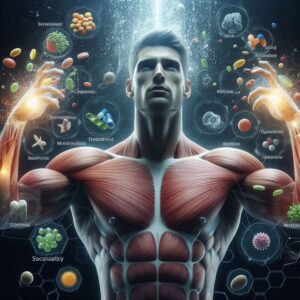Maximize Your Muscle Recovery: Essential Nutritional Strategies for Athletes
Achieving ultimate muscle recovery hinges on understanding and implementing the right macronutrient ratios in your dietary regimen. The trio of macronutrients—protein, carbohydrates, and fats—are not just crucial for energy provision but also serve as fundamental building blocks for your body’s structural integrity and essential physiological functions. Each macronutrient plays a distinctive role in repairing and regenerating muscle tissue, making it imperative for dedicated athletes aiming to enhance their athletic performance to grasp how these nutrients interact synergistically to foster effective recovery processes.
Among the trio, protein emerges as a critical player in muscle recovery, primarily due to its rich composition of essential amino acids that are necessary for effective muscle repair and growth. Consuming adequate protein after your workouts can dramatically increase muscle protein synthesis, which refers to the process where new proteins are formed to replace damaged ones, while simultaneously reducing the breakdown of existing muscle proteins. This delicate balance is pivotal for optimal recovery, enabling faster healing and better adaptation to the stresses of training. Moreover, carbohydrates are essential for restoring glycogen levels depleted during strenuous workouts, effectively fueling your next training session. Additionally, fats contribute to energy production and hormone regulation, both of which are vital for optimal muscle recovery.
To identify the most effective macronutrient ratio for enhancing your muscle recovery, a tailored approach is necessary, considering variables such as body composition, training intensity, and individual fitness objectives. A general guideline suggests that athletes should consume a combination of protein and carbohydrates within 30 minutes to 2 hours after exercising to optimize recovery. This critical timing correlates with your body entering a heightened state of nutrient absorption, making it the perfect moment to replenish your muscles and accelerate recovery.

Boost Muscle Recovery by Identifying Top Protein Sources
Recognizing the pivotal role of protein in muscle recovery is vital for anyone engaged in physical training. This essential macronutrient provides the necessary amino acids for muscle repair and growth, making it critical to incorporate protein-rich foods into your diet for effective muscle restoration. High-quality animal protein sources, such as eggs, dairy products, lean meats, fish, and poultry, deliver complete amino acid profiles that significantly benefit muscle regeneration and recovery.
For those who prefer plant-based alternatives or wish to diversify their protein intake, numerous excellent options are available. Foods like lentils, chickpeas, and black beans are not only nutrient-dense but also rich in protein, positively contributing to muscle recovery. Additionally, versatile products such as tofu, tempeh, edamame, and other soy-based options serve as fantastic complete protein sources that can be easily included in a well-rounded diet to support muscle healing.
Furthermore, protein supplements like whey, casein, or plant-based powders can effectively enhance your protein intake specifically for muscle recovery. These supplements offer a convenient means to meet your post-workout protein needs, seamlessly integrating into your favorite smoothies, shakes, or meals, thereby maximizing your recovery potential and supporting your overall fitness journey.
Restore Energy Levels: The Importance of Carbohydrates in Muscle Recovery
Carbohydrates play an indispensable role in muscle recovery by replenishing glycogen stores that become significantly depleted during intense physical exertion. Consuming carbohydrates within the first 30 to 60 minutes post-exercise can greatly assist in restoring energy levels and facilitating muscle recovery. During vigorous workouts, muscles primarily rely on glycogen as their main energy source, and the body is particularly efficient at storing glucose immediately after exercise. Therefore, the timing of carbohydrate intake is crucial, as it can greatly influence muscle glycogen synthesis and overall recovery performance.
Incorporating a diverse selection of nutrient-rich foods, such as legumes, fruits, and vegetables, which are abundant in natural sugars and starches, can enhance your muscle recovery while providing numerous health benefits. These foods are often high in fiber and loaded with essential nutrients, offering a steady release of energy alongside the vitamins and minerals necessary for overall health and effective recovery. By prioritizing these complex carbohydrates in your meals, you make informed dietary choices that significantly benefit your body’s nutritional needs and recovery processes.
Effective post-exercise nutrition is critical for muscle recovery. Combining carbohydrates with protein can greatly enhance muscle glycogen resynthesis and promote effective muscular repair. This powerful nutrient combination also stimulates insulin release, facilitating the transport of glucose and amino acids into muscle cells, thereby further supporting recovery and repair mechanisms.

Enhance Muscle Recovery Through the Inclusion of Healthy Fats
While discussions regarding muscle repair frequently emphasize protein and carbohydrates, the role of dietary fats is equally crucial for a holistic recovery strategy and overall health. Healthy fats are vital for hormone production, particularly testosterone, which significantly impacts both muscle growth and the recovery processes following exercise. Foods rich in omega-3 fatty acids, such as walnuts, flaxseeds, and fatty fish, offer anti-inflammatory properties that can help alleviate exercise-induced inflammation and expedite muscle recovery. Additionally, these fatty acids play an essential role in constructing cell membranes that are necessary for muscle repair.
By integrating a variety of healthy fat sources, including nuts, seeds, avocados, olive oil, and fatty fish, you can yield substantial benefits for your overall health and muscle regeneration. These fats not only enhance the flavor of your post-exercise meals or snacks but also provide essential energy while supporting various physiological processes associated with recovery. Explore different healthy fat options and consciously incorporate them into your diet; your muscles will undoubtedly respond positively to this mindful approach!
Although fats are a critical component of a balanced diet, moderation is essential. Avoid excessive consumption of unhealthy fats, such as trans and saturated fats, which can increase inflammation and impede healing and performance. Therefore, achieving the right balance of fats in your diet is vital for ensuring optimal muscle recovery and overall health.
Hydration: The Key Element for Optimal Muscle Recovery
One of the most frequently overlooked aspects of muscle recovery is the essential role of hydration. During physical activity, our bodies lose significant fluids through sweating, and neglecting to replenish these lost fluids can lead to dehydration. This condition can severely impair athletic performance and prolong muscle recovery times. Dehydration negatively impacts nutrient transport to muscles, increases the risk of cramping, and may even result in muscle damage, making it imperative to prioritize hydration.
Maintaining proper hydration not only aids in muscle recovery but also contributes to overall health and wellness. Adequate fluid intake supports nutrient transport, regulates body temperature, and helps eliminate waste products from the body. Ensuring you stay well-hydrated before, during, and after exercise is crucial for optimizing muscle recovery. While water remains the most effective option for hydration, consider incorporating electrolyte-rich beverages such as sports drinks or coconut water to replenish lost electrolytes during intense workouts.
Being attuned to your body's hydration cues is essential for maximizing recovery. Keeping an eye on indicators such as urine color, fluctuations in body weight, and sensations of thirst can provide valuable insights into your hydration status. This self-awareness can help you maintain optimal fluid intake, thereby promoting maximal muscle repair. Additionally, integrating more water-rich foods, such as fruits and vegetables, can further boost your hydration and recovery efforts.

Essential Micronutrients That Accelerate Muscle Recovery
Understanding the importance of micronutrients, which include essential vitamins and minerals, is crucial for effective muscle recovery and overall health. These micronutrients are not optional; they are vital components that influence various physiological processes, including exercise performance and recovery. For instance, the antioxidant properties of vitamin C can help combat the inflammatory and oxidative stress that arises during exercise, while vitamin D is crucial for maintaining bone health and supporting muscle function, both of which are integral to recovery.
Key minerals such as iron, magnesium, and zinc are essential for energy production, oxygen transport, and muscle function during physical activities. To promote optimal muscle repair, it’s essential to consume a well-balanced diet rich in fruits, vegetables, whole grains, lean meats, and healthy fats, thereby ensuring that you receive these vital micronutrients.
While athletes may contemplate supplementation with specific micronutrients to address deficiencies or meet the increased demands of rigorous training, it is crucial to seek professional guidance. Consulting with a healthcare professional or a certified dietitian before starting any supplementation regimen can ensure both safety and effectiveness, allowing you to make informed dietary decisions.
Ultimately, food plays a vital role in muscle recovery following intense physical activity. Achieving the right balance among macronutrients—including protein, carbohydrates, and fats—along with proper hydration and micronutrient intake, is essential for effective muscle regeneration and enhancing athletic performance. By being mindful of your dietary choices and providing your body with the necessary nutrients, you can accelerate healing, reduce the risk of injury, and boost your overall fitness level.
FAQs: Insights into Muscle Recovery and Nutritional Strategies
What are the primary processes involved in muscle recovery?
Muscle recovery is a complex and multifaceted process through which muscles repair and rebuild after experiencing physical stress, such as exercise or resistance training. This critical process is necessary for promoting muscle growth and enhancing overall physical performance, enabling your body to adapt effectively to the demands of training.
How does diet impact muscle recovery outcomes?
Your diet is a fundamental factor influencing muscle recovery, as it provides the essential nutrients required for muscle repair and growth. Achieving the right balance among macronutrients (protein, carbohydrates, and fats) and micronutrients (vitamins and minerals) is crucial for optimizing muscle recovery and improving overall athletic performance.
Which dietary approach is most effective for muscle recovery?
The most effective dietary strategy for muscle recovery typically includes a balanced mix of high-quality protein, carbohydrates, and healthy fats. Foods rich in protein, such as lean meats, fish, eggs, and dairy products, are particularly beneficial for supporting muscle repair and growth. Carbohydrates are essential for replenishing energy levels and glycogen stores, while healthy fats contribute to overall health and hormone production.
What is the recommended protein intake to support muscle recovery?
The general recommendation for protein intake aimed at muscle recovery ranges from 1.2 to 2.2 grams of protein per kilogram of body weight per day. This range can vary based on individual factors, including activity level, muscle mass, and specific training goals.
Are there specific foods that can effectively enhance muscle recovery?
Foods high in protein, such as chicken, turkey, salmon, eggs, Greek yogurt, and tofu, are particularly effective in supporting muscle recovery. Additionally, including complex carbohydrates from sources like whole grains, fruits, and vegetables, along with healthy fats from avocados, nuts, and olive oil, can further aid muscle recovery and improve overall athletic performance.
Should I consider using supplements to enhance my muscle recovery?
While a nutritious, well-rounded diet can generally provide the essential nutrients needed for muscle recovery, some individuals may find it beneficial to supplement with protein powders, branched-chain amino acids (BCAAs), or creatine to support their recovery and performance objectives. It is important to consult with a healthcare professional before introducing any supplements into your diet to ensure both safety and effectiveness.
This valuable information is brought to you by:
Reliable Resources for Muscle Recovery and Nutritional Guidance
Nourish Your Hair: Protein Intake and Hair Health. https://www.theproteinfactory.pk/blog/protein-and-hair-health/
The Maximum Calorie Intake to Lose Weight | Woman – The Nest. https://woman.thenest.com/maximum-calorie-intake-lose-weight-17436.html
The Article: Optimal Diet for Muscle Recovery appeared first on Acupuncture Cottam.
The Article Muscle Recovery: The Optimal Diet You Need appeared first on https://mcrtherapies.com
The Article Optimal Diet for Muscle Recovery You Need Was Found On https://limitsofstrategy.com
The Article Muscle Recovery: The Optimal Diet You Need First Appeared ON
: https://ad4sc.com


I really appreciate this deep dive into the nutritional strategies that can support muscle recovery. As someone who’s navigated the world of fitness for a few years now, I’ve often found that recovery is frequently overlooked. It’s easy to get caught up in the intensity of our workouts and forget that what we consume afterward can significantly influence our progress.